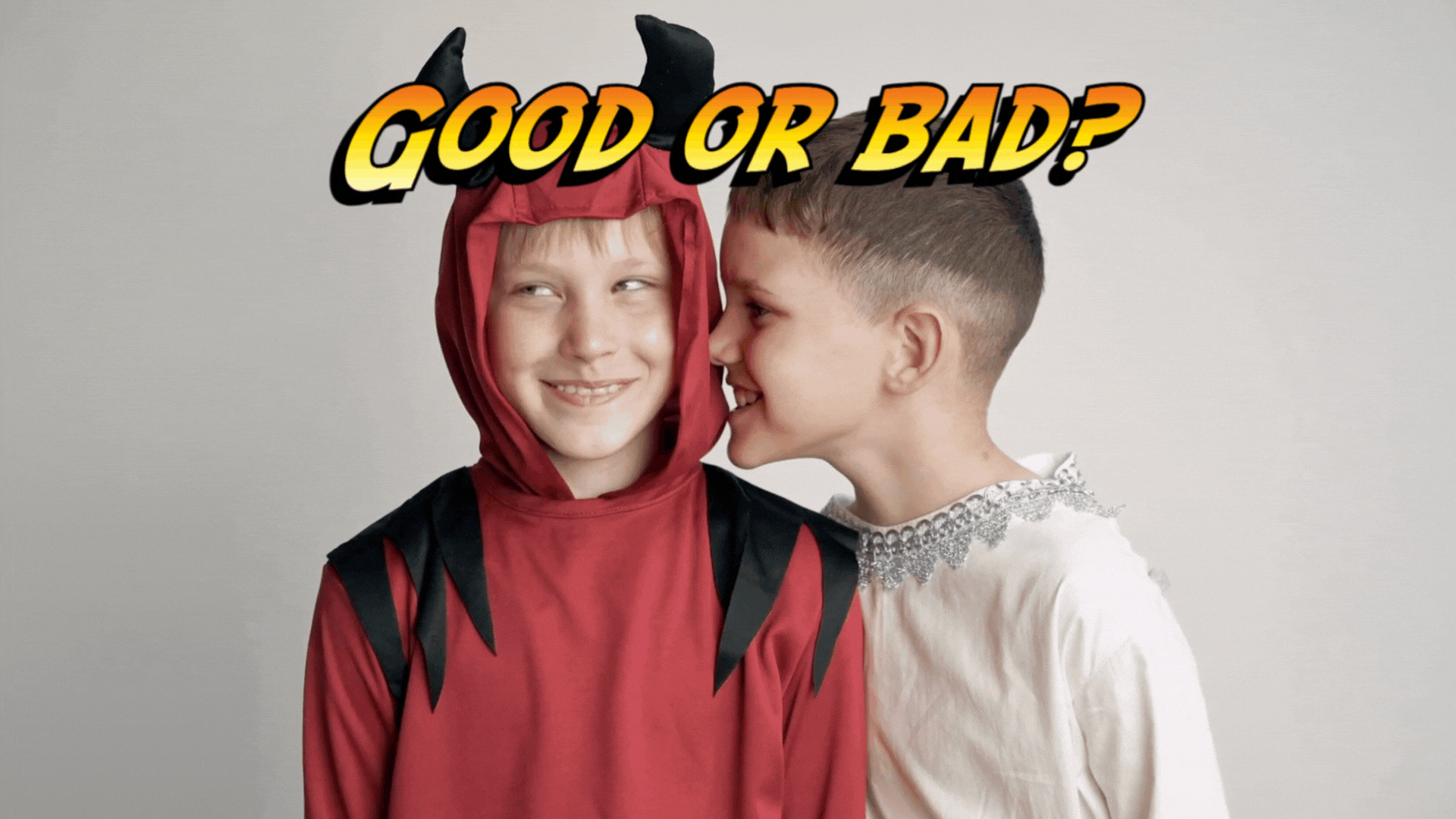[EN/PT] Good or Bad?
[EN]

When I was in high school, I remember well a debate we had in class: after all, are human beings good or evil by nature? I don't remember exactly who the thinkers cited at the time were, but I remember the central ideas. The first argued that humans are born good, and that it is society that corrupts them, while the second claimed that humans are born bad, acting correctly only when it suits them.
This philosophical duality seems to be reflected in real life. I have witnessed cases of people who grew up in extremely difficult environments and yet became examples of resilience and kindness. On the other hand, I have met people who were raised with love, financial stability, and every opportunity possible, but who chose crooked paths, lying, cheating, stealing, and even committing serious crimes. This leads us to a difficult question: is there a formula to guarantee that someone will become a “good person”?
Upbringing, family values, and social context undoubtedly influence this, but they may not be the only determining factors. There is also individual temperament, life experiences, and even biological factors that shape human behavior. We can educate, guide, set limits, and offer love, and all of this certainly helps, but there is no guarantee that it will work in all cases. Human beings are too complex to follow a single mold.

Take children, for example. It is common to see that, from an early age, they have difficulty sharing what they really like, such as a toy or a favorite food. This shows that human instinct tends toward selfishness. And this selfishness does not disappear with age; many adults, when given the opportunity to help, prefer to turn their backs.
Instinctively, it seems that human beings are born inclined toward evil and, throughout life, are molded to be good. There are those who, even with the best education and love, seem incapable of developing empathy or compassion. I once watched a documentary that showed the brains of psychopaths, pointing to well-defined neurological patterns. These are people who can take a life without any trace of remorse. This shows that, biologically, there are also predispositions that influence behavior.
But the environment also plays a role. Imagine a family that often goes hungry. The father, without decent opportunities to support his children, may find himself forced to steal or get involved in drug trafficking. In such cases, it is not just innate evil that drives the actions, but despair, lack of choice, and the pressure of reality. The environment in which one lives can indeed push someone down dark paths.
Given this, I believe that the answer lies in a combination of these two views. There is indeed a natural inclination that can lead to selfishness or aggression, but there is also the impact of the environment, experiences, and choices. Human beings are the result of what they carry within themselves, but also of the world around them.
Therefore, it is not just a matter of luck or destiny. People are not inherently good or bad; they are continually shaped. Being good requires effort, awareness, and willpower. And although we cannot completely control what we inherit or the world we are born into, we can choose how to act, react, and transform ourselves.
If you've made it this far, thank you very much for your time, and if this content was useful in any way, please leave your upvote and reblog!

[PT]

Quando eu estava no ensino médio, lembro bem de um debate que tivemos em sala de aula: afinal, o ser humano é bom ou mau por natureza? Não me recordo exatamente quem eram os pensadores citados na ocasião, mas lembro das ideias centrais. A primeira defendia que o homem nasce bom, e que é a sociedade quem o corrompe, a segunda afirmava que o homem nasce mau, agindo corretamente apenas quando isso lhe convém.
Essa dualidade filosófica parece se refletir na vida real. Já presenciei casos de pessoas que cresceram em ambientes extremamente difíceis e, ainda assim, tornaram-se exemplos de superação e bondade. Por outro lado, conheci pessoas criadas com amor, estabilidade financeira e todas as oportunidades possíveis, mas que escolheram caminhos tortuosos, mentindo, enganando, roubando, até mesmo cometendo crimes graves. Isso nos leva a uma pergunta difícil: existe alguma fórmula para garantir que alguém se torne uma “boa pessoa”?
A criação, os valores familiares e o contexto social, sem dúvida, influenciam, mas talvez não sejam os únicos determinantes. Há também o temperamento individual, as experiências ao longo da vida e até fatores biológicos que moldam o comportamento humano. Podemos educar, orientar, impor limites e oferecer amor, e tudo isso certamente ajuda, mas não há garantia de que funcionará em todos os casos. O ser humano é complexo demais para seguir um único molde.

Tomemos como exemplo as crianças. É comum vermos que, desde cedo, elas têm dificuldade em compartilhar aquilo que gostam muito, como um brinquedo ou uma comida preferida. Isso demonstra que o instinto humano tende ao egoísmo. E esse egoísmo não desaparece com a idade, muitos adultos, diante da oportunidade de ajudar, preferem virar as costas.
Instintivamente, parece que o ser humano nasce inclinado ao mal e, ao longo da vida, é moldado a ser bom. Há quem, mesmo com a melhor educação e amor, pareça incapaz de desenvolver empatia ou compaixão. Já assisti a um documentário que mostrava o cérebro de psicopatas, apontando padrões neurológicos bem definidos. São pessoas que podem tirar uma vida sem qualquer traço de arrependimento. Isso mostra que, biologicamente, há também predisposições que influenciam o comportamento.
Mas o ambiente também tem peso. Imagine uma família que passa fome frequentemente. O pai, sem oportunidades dignas para sustentar os filhos, pode se ver forçado a roubar ou entrar no tráfico de drogas. Nesses casos, não é apenas a maldade inata que conduz às ações, mas o desespero, a falta de escolha, a pressão da realidade. O meio em que se vive pode, sim, empurrar alguém para caminhos obscuros.
Diante disso, acredito que a resposta está em uma combinação dessas duas visões. Há, sim, uma inclinação natural que pode tender ao egoísmo ou à agressividade, mas há também o impacto do ambiente, das experiências e das escolhas. O ser humano é resultado do que carrega dentro de si, mas também do mundo ao seu redor.
Portanto, não se trata apenas de sorte, nem de destino. As pessoas não são boas ou más por essência pura, elas são moldadas continuamente. Ser bom exige esforço, consciência e vontade. E, embora não possamos controlar completamente o que herdamos ou o mundo em que nascemos, podemos escolher como agir, reagir e nos transformar.
Se chegou até aqui muito obrigado pelo seu tempo e se de alguma forma este conteúdo foi útil, deixe seu upvote e reblog!

Posted Using INLEO


sim eles tem a redução da atividade da Amygdala no cerebro, isso esta associado a falta de empatia com o próximo!
obs: pq seu link ganhou esse sufixo ? ficou engraçado!
Eu acabei de repará isso também! Nem sei como aconteceu isso, mas ficou muito engraçado mesmo. Pensei que até tinha escrito o titulo com isso no final. rsrsrsr
🤪🤪🤪
I agree with you that experience and individual backgrounds tend to shape their behaviour.
Congratulations @elderdark! You have completed the following achievement on the Hive blockchain And have been rewarded with New badge(s)
Your next target is to reach 8000 replies.
You can view your badges on your board and compare yourself to others in the Ranking
If you no longer want to receive notifications, reply to this comment with the word
STOP